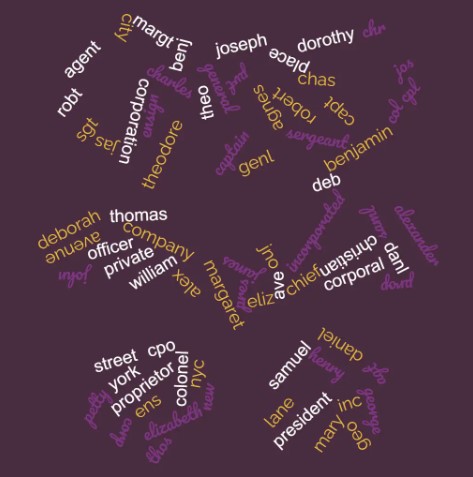
The Power of Using Abbreviations
In newspapers, you are likely to find abbreviations of people’s given or first names. So, when searching online, it behooves us to search with the abbreviation of that first name as well as the full first name.
To demonstrate the power of searching with abbreviations, I searched for a common name, “William Smith,” and received 30,379 results. I then searched for “Wm Smith,” and the search returned 9,783 results. That is an increase of 32%, just by using the abbreviated name!
Old Newspaper Publishers Sought to Minimize Space
In old newspapers, abbreviations were used to save space. Abbreviations were used to shorten many words – the most notable being given names and addresses. In the “olden days,” newspaper publishers were quite frugal. They generally kept each issue to the same number of pages, whether they be 4, 8, or other. Space was at a premium. To maximize the text on a page, they often used abbreviations to save space and thus save ink and paper.
Abbreviation Search Examples
Your search index database is not smart enough to automatically search for the abbreviation of “Thos” for “Thomas”. The same issue applies when trying to interpret “Ave” for the word “Avenue” So if you are entering “335 14th Avenue” – if the search index includes “Ave” the search will not be successful. Therefore, you must search both “335 14th Avenue” and “335 14th Ave” to get all possible results.
Another trick is to abbreviate titles, such as “Col” for “Colonel”. I did a search for “Colonel Charles Lindbergh”, and received 887 results. Then I searched “Col Charles Lindbergh” and got 1,011 results. A 115% improvement!
Yet another trick is to abbreviate words such as “Ave” for “Avenue”. I searched “Fairfax Avenue” and got 3,192 results. Then I searched “Fairfax Ave” and got 7,748 results. A 240% improvement!
Searching Using First Initial of Given Name with Surname
It is also helpful if you search using just the first initial of the given name. In many articles in old newspapers, lists of people often just used the first initial of the given name to save space. So that behooves you to perform a phrase search using the first initial together with the surname in your search criteria.
Below is a list of common abbreviations frequently used in old newspapers. Current newspapers do not employ these abbreviations as much as in older newspapers.
Common Abbreviations
| Eliz for Elizabeth | Capt for Captain |
| Wm for William | Pl for Place |
| Sgt for Sergeant | Co for Company |
| Ave for Avenue | Pres for President |
| Corp for Corporation | Ln for Lane |
| Jno for John | Col for Colonel |
| St for Street | Chas for Charles |
| NYC for New York City | Benj for Benjamin |
| Jos for Joseph | Cpl for Corporal |
| Jas for James | Geo for George |
| Margt for Margaret | Robt for Robert |
| Saml for Samuel | Thos for Thomas |
| Inc for Incorporated | Genl for General |
| Deb for Deborah | Danl for Daniel |
| Hy for Henry | Pvt for Private |
| CPO for Chief Petty Officer | Ens for Ensign |
| My for Mary | Theo for Theodore |
| Agt for Agent | Prop for Proprietor |
| Ag for Agnes | Alex for Alexander |
| Chr for Christian | Dy for Dorothy |
Additional Resources
I highly encourage you to use the abbreviations above as part of your search repertoire. And many more abbreviations were often used. You can access a terrific list of given name abbreviations from Genealogy In Time at http://www.genealogyintime.com/dictionaries/list-of-first-name-abbreviations.html
Summary
So, when developing your search criteria for newspaper searches, you need to include abbreviations in your repertoire. You will be amazed at the number of increased results.